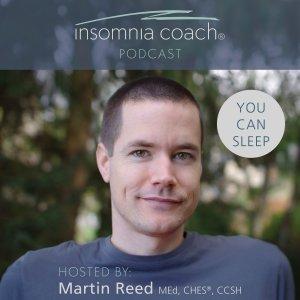Insomnia Coach® Podcast

How Michelle got to the root cause of her insomnia and improved her sleep after 15 years of unhelpful experiments, research, and sleep efforts (#24)
Listen to the podcast episode (audio only)
Michelle spent 15 years researching sleep and trying lots of different things to get rid of her insomnia. She did all she could to control her sleep but all that happened was sleep (or a lack of it) ended up controlling her as it slowly became an obsession and took a hugely influential role in her life.
Fortunately, Michelle got to the root cause of her insomnia — the sleep-related thoughts she had developed and the sleep-related behaviors she implemented in a bid to improve her sleep that were actually perpetuating the problem.
In this episode, Michelle shares the techniques she found most helpful, talks about the short-term difficulties she experienced when changing her sleep habits, and shares how she ended up modifying two core behavioral techniques — sleep restriction and stimulus control — to better suit her while also abandoning all efforts to control sleep.
Today, Michelle averages around seven to eight hours of sleep and lives and plans her life without giving sleep any thought whatsoever. She also knows exactly how to respond to any difficult nights because her new habits are skills that will remain with her for the rest of her life.
Click here for a full transcript of this episode.Click here to hide the transcript.
Martin Reed:
Welcome to the Insomnia Coach Podcast. My name is Martin Reed. I believe that nobody needs to live with chronic insomnia and that evidence-based cognitive and behavioral techniques can help you enjoy better sleep for the rest of your life.
Martin Reed:
The content of this podcast is provided for informational and educational purposes only. It is not medical advice and is not intended to diagnose, treat, cure, or prevent any disease, disorder, or medical condition. It should never replace any advice given to you by your physician or any other licensed healthcare provider. Insomnia Coach LLC offers coaching services only and does not provide therapy, counseling, medical advice, or medical treatment. The statements and opinions expressed by guests are their own and are not necessarily endorsed by Insomnia Coach LLC. All content is provided "as is" and without warranties, either express or implied.
Martin Reed:
Hi Michelle. Thank you so much for taking the time out of your day to come on the podcast.
Michelle Pragnell:
A pleasure, Martin.
Martin Reed:
It's great to have you on. As always, I like to start right at the beginning. So, can you tell us a little bit more about when your sleep problems began and perhaps if you can remember what initially triggered those issues with sleep?
Michelle Pragnell:
It was about 15 years ago after a fairly stressful period in my life. And yeah, I just started having sleep problems, which sort of morphed into insomnia over the years. They crept up on me and I got to the point where I was really struggling with sleep.
Martin Reed:
Yeah. So, was it more to do with trouble falling asleep at the start of the night, or was it to do with waking during the night?
Michelle Pragnell:
Yeah, in the beginning, it was waking through the night and not being able to get back to sleep. So, I'd watch TV, but all this was in bed which I realize now is a no-no. And then, it seemed to start at the beginning of the night, so I couldn't actually get to sleep. And then when I got to sleep, I'd only sleep for short periods of time and I'd wake up and then I couldn't get back to sleep. So, I really wasn't getting that deep, revitalizing sleep. The sleep I was getting was fragmented and light, very light. Yeah.
Martin Reed:
Yeah, yeah. So, I think a lot of us realize that sleep disruption from time to time is just a normal part of life...






 Visit Podcast Website
Visit Podcast Website RSS Podcast Feed
RSS Podcast Feed Subscribe
Subscribe
 Add to MyCast
Add to MyCast